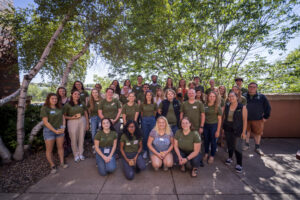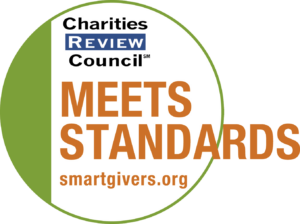Minnesota GreenCorps
Minnesota GreenCorps members address critical environmental issues and increase community resilience to climate change. The Minnesota GreenCorps program is coordinated by the Minnesota Pollution Control Agency and places members at host site organizations around the state. Members gain marketable skills in the environmental field while making a difference in communities by benchmarking and analyzing data, collaborating with community partners, delivering environmental training and education, mobilizing volunteers, and implementing best practices to improve water and air quality, and prevent, reduce, and divert waste. Members serve at public entities (local, regional, state, tribal), school districts, public education institutions, and nonprofits. The program has a variety of positions available in the areas of energy conservation, green transportation, community readiness and outreach, green infrastructure improvements, as well as waste reduction and recycling.
Essential qualifications to serve with Minnesota GreenCorps:
- Two years post-secondary education (a two-year associates degree or completion of sophomore year in a four-year degree program) or equivalent of 6 months professional experience (volunteer, internship, or work).
- Demonstrated interest in the environment, including energy and water conservation, active transportation, urban planning, local foods, recycling, etc.
- Interest in service and community work and commitment to complete the service term
- Ability to work well independently and on diverse teams
- Ability to build and maintain relationships
- Effective communication, presentation, and writing skills
- Ability to take initiative and effectively manage projects
- Ability to research and organize information
- Functional computer skills: word processing, spreadsheet, database management
- Positions that perform driving require a valid driver’s license and ability to pass a driving record check. Some positions require access to a personal vehicle for transportation.
- Most positions are based in an office setting, but some positions may require the ability to work outdoors in adverse weather conditions on challenging terrain
Top reasons that members like serving in Minnesota GreenCorps:
- Develop job skills and receive professional training
- Gain hands-on experience managing projects at host sites
- Network in the environmental field
- Engage your community
- Make a positive environmental impact and strengthen communities in a changing climate
Professional development opportunities with GreenCorps:
- Receive a training budget of $300/member to participate in conferences, trainings, and workshops of your choice. Members may also use the funding to gain certifications in the sustainability and environmental fields, such as Minnesota Master Water Stewards, Master Recycler, Project WET/WILD, HAZWOPER, LEED Green Associate, Master Naturalist, etc.
- Partner with a professional mentor in the environmental field to guide your career journey.
- Receive quarterly training from the Minnesota Pollution Control Agency on relevant environmental topics, as well as a “Life After AmeriCorps” resume writing and interviewing training that helps prepare MN GreenCorps members for their post-service job search.
- Utilize up to 40 service hours for job shadowing or informational interviews.
- Find environmental jobs by joining the MN GreenCorps Professional Network Facebook group, an alumni network to share and view environmental positions.




